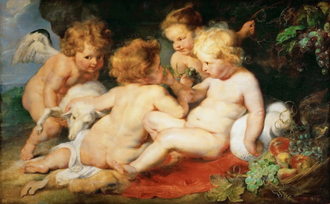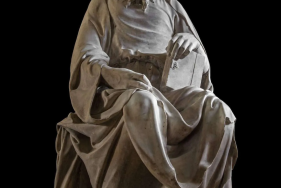Gospel in Art: Men and women will be like the angels in heaven

Christ and John the Baptist as children and two angels, by Pieter Paul Rubens and Frans Snyders, 1615 © Kunsthistorisches Museum, Vienna
Source: Christian Art
Gospel of 5 June 2024
Mark 12:18-27
Some Sadducees - who deny that there is a resurrection - came to him and they put this question to him, 'Master, we have it from Moses in writing, if a man's brother dies leaving a wife but no child, the man must marry the widow to raise up children for his brother. Now there were seven brothers. The first married a wife and then died leaving no children. The second married the widow, and he too died leaving no children; with the third it was the same, and none of the seven left any children. Last of all the woman herself died. Now at the resurrection, when they rise again, whose wife will she be, since she had been married to all seven?'
Jesus said to them, 'Is not the reason why you go wrong, that you understand neither the scriptures nor the power of God? For when they rise from the dead, men and women do not marry; no, they are like the angels in heaven. Now about the dead rising again, have you never read in the Book of Moses, in the passage about the Bush, how God spoke to him and said: I am the God of Abraham, the God of Isaac and the God of Jacob? He is God, not of the dead, but of the living. You are very much mistaken.'
Reflection on the painting
The question of the afterlife has intrigued humanity since ancient times. In this morning's gospel reading, Jesus is approached by the Sadducees, a Jewish group that did not believe in life after death. They engage Jesus, aware that He holds a different view on this issue. The Sadducees' question about a woman with seven husbands implies they see the afterlife as a mere extension of earthly life. However, Jesus' response suggests otherwise: "When they rise from the dead, men and women... are like the angels in heaven." This indicates that life in heaven is not a continuation of earthly life but is qualitatively different. St. Paul also speaks of the afterlife in terms of transformation, stating, "We shall all be changed."
With Jesus saying that after this life we will be like the angels in heaven, it is a good opportunity to look at angels in art. Angels have been a captivating subject in art for centuries, depicting them as cute and cuddly divine messengers. The earliest depictions of angels in Christian art began to appear in the 3rd and 4th centuries, often inspired by Roman and Greek artistic traditions. These early representations were influenced by the classical depictions of winged figures such as Eros (Cupid) in Roman art, which provided a visual template for portraying these ethereal and heavenly beings.
Our painting by Pieter Paul Rubens and Franz Snyders, depicts Christ and John the Baptist as Children with Two Angels. It is almost hard at first glance to distinguish the four. Indeed, we tend to think of angels as little winged infants, closely resembling young children. There is a wonderful sense of intimacy and divine innocence in this painting. The two angels are positioned protectively and attentively around the John and Jesus, enhancing the heavenly and sacred atmosphere of the scene. One of the angels holds the sacrificial lamb (referring to the body of Christ) another angel holds a bunch grapes (the blood of Christ).
LINKS
Gospel in Art: https://christian.art/
Today's Reflection: https://christian.art/daily-gospel-reading/mark-12-18-27-2024/


















